Linux Fest Northwest 2003
For me the day began with at 5am, scrambling to make sure I remembered to bring everything -- laptop, Zaurus, cat-5 cable, cellphone, digital camera, USB to serial adapter, camera cable for downloading pictures (I ought to be able to do that with the Zaurus, shouldn't I?), etc. I wasn't sure exactly how long it would take me to make it to Bellingham from Seabeck, but I was pretty sure I needed to catch the 7:10 Kingston to Edmonds ferry. I made it with 10 mintes to spare, and spent the 30 minute crossing writing the start of this report. The Zaurus keyboard was particularly handy since I had dropped my stylus on the floor as I rushed out the door.
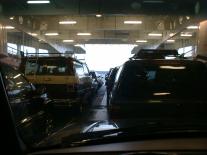
I learned later that a couple of other KPLUG members (former KPLUG President Shawn Bakker and former Vice-President Ron Tidd -- everyone in KPLUG seems to be either a current or former officer), were about 50 feet to my right on the same ferry. We didn't coordinate very successfully this year, but we'll learn.
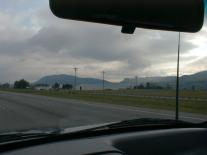
The drive up I-5 was uneventful, passing through Edmonds, Montlake Terrace (home to SEA, Inc.), Everett (home port for a large part of the Pacific Fleet), Mt. Vernon (site of last year's Wetnet field day event) and finally, after about 2 hours and 48 minutes of travel, to Bellingham. Home to Western Washington University, Bellingham Technical College and the 4th annual Linux Fest Northwest
I saw a familiar face right away, David Smead, owner of Ample Power, was getting his portable demo table setup. It runs off of a couple of batteries and a Trace 800 watt inverter. His company uses Linux to develop power management systems for boats, Rvs, or just about anything that runs off a battery. Everything from schematic capture to board layout and embedded software development is done using Linux.
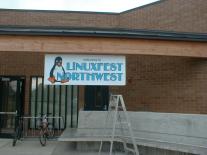
I had arrived before the official doors opened in order to help setup the KPLUG booth. Our resident expert on odd hardware, Dennis Parsley, had planned on bringing some of his systems running Linux -- A Dreamcast, Sun Ultra Sparc and 68k MAC. But he got called in to work at the last second as he was waiting in line for the ferry. So KPLUG's presence fell from 2 tables to a pile of business cards. Next year we'll have a backup plan in place. Something that include cellphones, multiple cars and multiple demo computers.
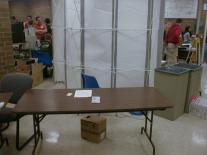
Ron & Shawn showed up and we staffed the KPLUG booth just long enough to realize that something was wrong -- no KPLUG President (who was wisely riding the Pogo Linux bus), and no Dennis. So we left a pile of KPLUG business cards and my cat-5 box on the table and headed off to one of the first lectures of the day, given by Red Hat Linux Bible author Chris Negus and TACLUG President Chuck Wolber.
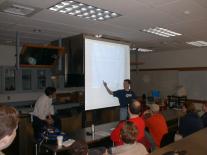
The first lecture was on the upcoming book 'Linux Toys', they are putting together instructions on how to build fun projects with Linux. One example is using the xmame emulator to play old console arcade games like 1942. After Chuck figured out the joystick was unplugged things went smoothly. They also have a jukebox project where you can insert a CD, it will rip it to Ogg Vorbis format and save it to harddrive, and then randomly play all the songs in a continuous loop. Another project is a remote controlled car that is conneted to a Linux system using a LynX-port relay control board. A home-built Digital TV Recorder is also in the works.
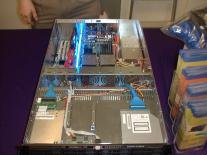
We then wandered around, checking out the variety of booths. The guys from Pogo Linux were very knowledgeable and had a RAID system running with 12 120Gig Serial ATA drives. This system was room temperature to the touch, and only costs $8k! Configured as a RAID5 you would have 11 x 120Gig or 1.3TERAbytes of storage. Zowie! That's a lot of storage (and a lot of stuff to backup, so you better buy two of them). The only concern I would have about the system is that the Serial ATA connectors don't appear to have a positive locking system. Not that a rackmount server is going to see a lot of movement until the next NW earthquake.
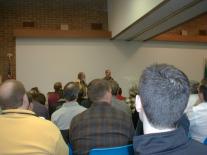
The keynote speaker for the event was Jon 'Maddog' Hall, from Linux International. He was introduced by president of BTC, who seemed a bit overwhelmed by this year's turnout for the event. The room was packed, I estimated at least 200 people were sitting and standing in the room, and the exhibit hall looked like it was still packed as well.
Maddog talked about approaches to selling Open Source to the business, governments and educators. He gave his presentation using Star Office, and did an excellent job of explaining Open Source and how it can help companies and institutions by giving them control over the software they are using. One of his examples was a Brazillian company that used Open Source to replace an outrageously expensive piece of software (1Million per seat) and was able to stay in business and employ 19 people. In addition to staying in business they were able to customize the software to their needs, and fix problems quickly when they arose.
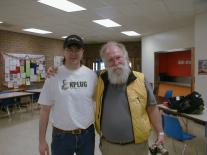
There was very little mention of Microsoft, which is appropriate. Open Source and Linux stand on their own merits, not as an anti-Microsoft system. Maddog did point out that Microsoft is trying to embrace Open Source in their own twisted way (my words). Their shared source initiative allows select groups to view the source to windows via a Microsoft controlled interface. As I pointed out when talking to Maddog later, it doesn't really matter how much you can look at it if you can't compile it! I don't think shared source is anything to worry about.
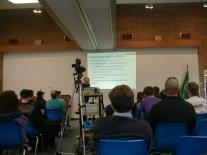
Dr. Crispin Cowan of Immunix gave a talk that covered the enhanced kernel that Immunix has developed. They have built custom kernel extensions to protect against stack overflows, race attacks, printf format string vulnerabilities and a system that limits what user level applications can access on the system (a fine-grained chroot enviornment without having to duplicate all the system libraries and utilities). He also talked about the coolest game since Pong. Its called Capture The Flag, and its played at the annual DefCon security convention in Nevada. Players attempt to keep their server up and running (a scoring system polls the services on the players box, adding or subtracting points based on the responses it sees), while attacking other player's systems and attempting to plant their 'flag' on the other systems. Last year's game was designed by Seattle's own Ghetto Hackers. This looks like a blast, and I may try to put together a regional event for those who can't make it to DefCon.
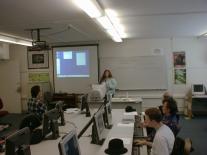
KPLUG's Vice President Rikke Giles gave a tutorial on getting started with GLADE, which is a library that takes the grunt work out of designing user interface with GTK. She covered the basics of getting a simple GLADE framework created. I missed most of the tutorial since I got hungry and went in search of food. Here's a copy of the tutorial she gave earlier this year.
One of the few problems with the fest was the lack of food. There was an espresso/pastry stand, and there were hotdogs available for a while but I missed out and they were closed by the time I went in search of food. My other problem was that I kept running into people to talk to, and none of them were in a food line.
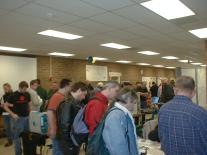
The turnout was what I expected, huge! My gauge for such event is 'will I go?' If it can manage to get me to drive 3 hours each way then there are probably a bunch of other people who are going to show. Using the door prize tickets as an estimate there were somewhere around 1000 people who showed up to see what Linux Fest was all about. The layout of the fest was in a triangle pattern, with tables on the outside walls and tables in the center in the same shape. This worked out pretty well I think, giving enough room for people to mill around and still move past those who had paused to chat with the exhibitors.
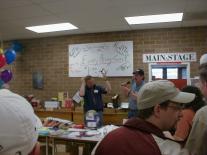
There was a wide variety of tables to explore. I meant to go around and take pictures of all of them, but didn't get the chance (lack of nutrients may hav also has something to do with this oversite). But there were OpenBSD demonstrations -- a OpenBSD based T1 router, Ample Power's power management modules, an 802.11 access point on Soekeris(sp?) board. Python and Perl Tutorials and teachers, a Chinese Desktop, 60% off Linux books (no O'Rielly books though), Linux-ware (clothes), TiVO hacking (I really regret missing that one), book signings by Chris Negus and Illiad, and tons of Raffle items -- SCO, Red Hat, SuSE, DigiTemp, Tuxes, etc. Whew! Next year I promise to take more pictures.
At the end of the show I was able to talk to Maddog Hall a bit. He is also godfather to Linus's two children, so he gets to see Linus socially when they are in the same town (Maddog lives in New Hampshire and Linus is in California). One time when he was out with Linus an enthusiastic Linux user recognized Maddog (how could you miss him with that distinctive beard!) and started to tell him how much he loves Linux, Not realizing who Linus was until Maddog said 'Well, then you probably want to talk to this guy', leaving the Linux user speechless when he realized who Linus was.
The Fest was a great success. I'd like to thank everyone who helped put it on, especially the guys at BLUG (Bellingham Linux User Group). There is some talk on the mailing list of trying to move it to a more central location, but I think anyone will have trouble putting together the set of skill and services provided by BTC and BLUG. I'm looking forward to next year already. Now if we can just get Linus to take a little drive north next year...